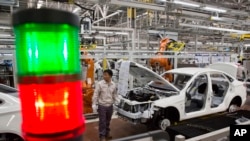The world economy will grow slower than expected this year and will pick up in 2016, if there is investment. That is the latest forecast by the Paris-based Organization for Economic Cooperation and Development (OECD).
In its latest global outlook launched in Paris Wednesday, the OECD predicts growth for China and the United States will slow this year, compared to 2014.
The organization cut its forecast for China to 6.8 percent this year, compared to 7.4 last year. The U.S. economy is only expected to grow by two percent this year, down from 2.4 percent last year.
The OECD also trimmed forecasts for other big economies, like Japan and Canada. Presenting the latest bi-yearly outlook, OECD Secretary-General Angel Gurria said the process of healing from the worst economic crisis in decades has been slow.
“Years of weak investment, years of weak consumption, have dragged down potential growth, which in turn has reduced investment prospects for companies, and employment prospects for our citizens,” said Gurria.
The OECD represents many of the world’s richest nations, and its outlook for some regions was more upbeat. Growth in the eurozone is expected to pick up slightly to 1.4 percent this year, partly thanks to the European Central Bank’s supportive monetary policies. But the OECD also urged the region to overcome disagreements about Greece’s debt payments, which have raised fears of a default.
The report’s big message was for more investment. If that happens, Gurria said, it will boost world growth to nearly four percent in 2016 - and finally turn the page on the economic crisis that hit in 2008.
“If investment is there, growth will come. And that will... just to give you a size of the damage of the crisis, that will get the world economy to cruising speed. We will recover the four percent cruising speed of the world economy only eight years after the crisis. This is the size of the damage, and the breadth of the challenge,” said Gurria.
The OECD also predicts unemployment will drop next year, but Gurria said 40 million people will still be out of work, more than seven million more than before the crisis.




